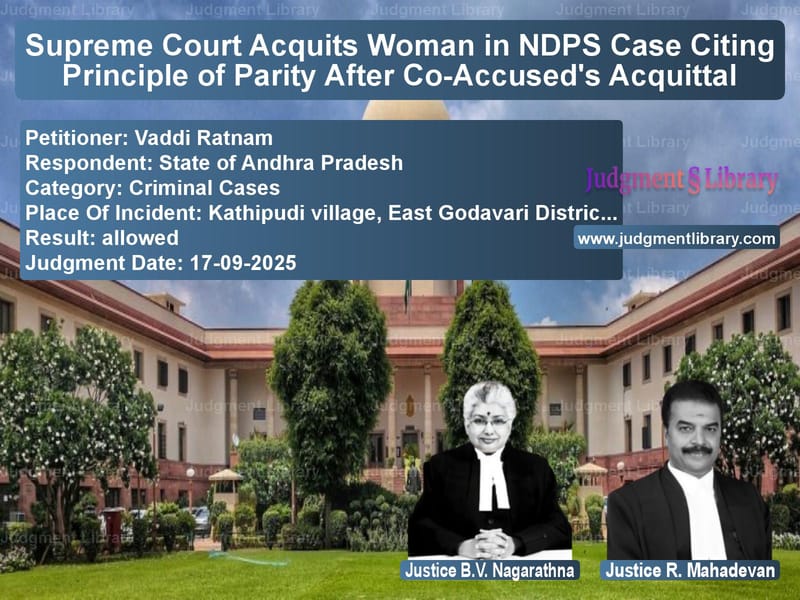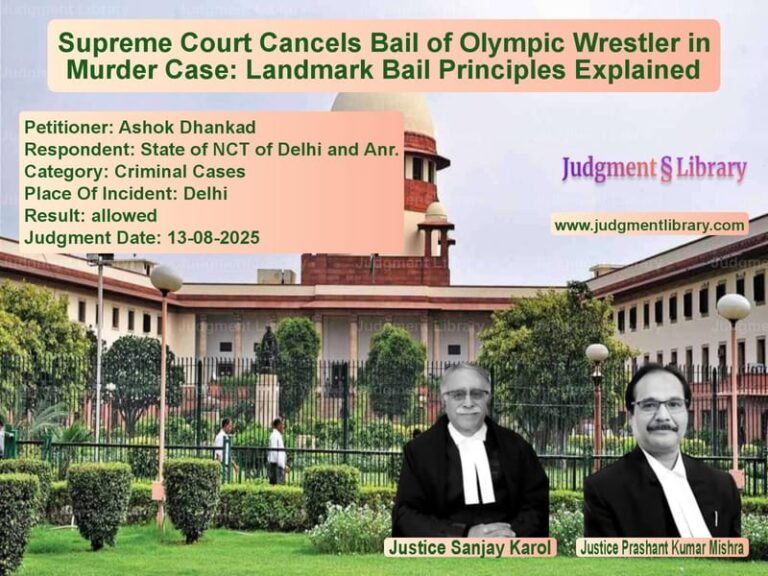Supreme Court Acquits Woman in NDPS Case Citing Principle of Parity After Co-Accused’s Acquittal
In a significant judgment that highlights the importance of consistency in criminal justice, the Supreme Court of India recently acquitted a woman who had been convicted for possession of opium, applying the principle of parity after her co-accused had been acquitted in the same case. The ruling brings to light crucial aspects of criminal jurisprudence, particularly in cases under the stringent Narcotic Drugs and Psychotropic Substances (NDPS) Act where convictions carry severe mandatory minimum sentences.
The case dates back to January 1, 2002, when the State Task Force Prohibition and Excise Inspector along with other officials were on patrolling duty near Dayamani Restaurant in Kathipudi village. During their patrol, they noticed two women – the appellant Vaddi Ratnam (Accused No. 2) and co-accused Nerella Vijaya Lakshmi (Accused No. 1) – proceeding on foot. According to the prosecution, upon noticing the raid party, the co-accused immediately handed over a yellow handbag she was carrying to the appellant. Both women allegedly tried to flee but were apprehended by the officials.
When questioned, the women reportedly disclosed that the handbag contained opium. A search conducted by the officials revealed six packets of opium – five containing one kilogram each and the sixth containing half a kilogram, totaling 5.5 kilograms of the contraband substance. During interrogation, both accused persons stated that they were engaged in the opium trade and that the contraband had been procured from Anaparthi for resale purposes.
Based on these events, Crime No. 466 of 2001-02 was registered at the Prohibition and Excise Station in Prathipadu, East Godavari District, against both women under Section 8(c) read with Section 9(vi) of the NDPS Act. The case eventually came before the Special Sessions Court for Trial of Cases under the NDPS Act (1st Additional Sessions Court) in East Godavari at Rajahmundry.
The Trial Court framed charges under Section 8(c) read with Section 18 of the NDPS Act. After recording evidence, the court delivered its judgment on October 14, 2005, in N.D.P.S. S.C No. 14 of 2002, convicting both the appellant and the co-accused. The court imposed the minimum sentence prescribed under the NDPS Act – rigorous imprisonment for ten years for each accused. Additionally, they were directed to pay a fine of Rs. 1,00,000 each, with a default stipulation of simple imprisonment for two and a half years.
Aggrieved by this conviction and sentence, the appellant filed Criminal Appeal No. 1775 of 2005 before the High Court of Judicature of Andhra Pradesh at Hyderabad. The High Court, in its judgment dated January 4, 2013, dismissed the appeal and upheld the conviction and sentence imposed by the Trial Court. The High Court observed that the Inspector of Prohibition and Excise (PW5), Superintendent Inspector (PW3), and the Panchayat Secretary who acted as a mediator for the seizure (PW1) all supported the prosecution’s version and confirmed the alleged possession of contraband by the accused persons. The court also referenced the chemical examiner’s report, which confirmed that the seized substance was opium. Based on this evidence, the High Court concluded that the prosecution had successfully established the recovery of a commercial quantity of opium from the possession of the accused persons.
Unsatisfied with the High Court’s decision, the appellant approached the Supreme Court, challenging the judgment dated January 4, 2013. However, a significant development had occurred in the interim that would fundamentally change the complexion of the case.
During the proceedings before the Supreme Court, the counsel for the State made a crucial submission. He fairly acknowledged that the co-accused (Accused No. 1) had been acquitted by the High Court through its judgment dated June 20, 2014, passed in Criminal Appeal No. 1775 of 2005. The State further submitted that it had not taken any steps to challenge this acquittal. This created an anomalous situation where for the same incident, based on the same evidence, one accused stood convicted while the other had been acquitted.
In response to this submission, the appellant’s counsel drew the Court’s attention to the fact that both accused had been implicated in respect of the very same incident, that common evidence had been led during the trial for both accused, and that when the High Court had acquitted Accused No. 1 and the State had accepted that judgment, the principle of parity should apply to grant similar relief to the appellant (Accused No. 2). The counsel specifically argued that taking into consideration the judgment passed by the High Court in Criminal Appeal No. 1775 of 2005 dated June 20, 2014, and by applying the principle of parity, the impugned judgment should be set aside and the appellant should also be acquitted.
The Supreme Court, comprising Justice B.V. Nagarathna and Justice R. Mahadevan, carefully considered these arguments and examined the judgment dated June 20, 2014, by which the High Court had acquitted the co-accused. The relevant portion of that judgment contained some crucial observations that would become central to the Supreme Court’s decision.
The High Court, while acquitting the co-accused, had noted: Yet another contention of the learned counsel for the appellant is that the conscious possession of the contraband with the appellant was not proved by the prosecution. The appellant-accused along with another person was tried for possession of Opium. It is the case of the prosecution that one of the ladies, who was carrying the bag containing Opium, shifted her bag to the other lady on seeing the police. But the prosecution has miserably failed to prove the person who actually carried the said bag and who actually transferred the said bag to the other lady.
The High Court had further observed that P.W.1, who was the mediator, in his chief examination deposed as follows: The accused present in the Court hail are the persons arrested by the Excise Police in our presence. He does not remember from whose possession the handbag containing Opium was seized and which of the accused was holding M.O.1 bag containing Opium, for the first time, they noticed them.
Significantly, the High Court noted that both P.W.1 and P.W.2, who were mediators to the seizure report, had turned hostile. The prosecution was not clear as to the person who was in conscious possession of the contraband. The High Court emphasized the seriousness of the offence, noting that on conviction, a minimum of ten years of imprisonment is imposed, and basing conviction on weak evidence would be highly unsafe.
Even P.W.5 – the Prohibition & Excise Inspector – had stated that a person who was wearing a white saree was holding the yellow coloured bag and on seeing them, she handed over the said bag to the other lady. However, the High Court found that the evidence of P.W.5 was not specific as to the culprit, who was holding the bag and who transferred the said bag to another lady. The evidence of the Excise Officials do not clearly establish that the appellant was in conscious possession of the said bag. In this background of the matter, this Court feels that it is not safe to convict the appellant for the said offence.
Based on these findings, the High Court had allowed the criminal appeal of the co-accused, setting aside the conviction and sentence imposed by the Trial Court and acquitting her of all charges.
The Supreme Court, in its analysis, noted that since this judgment acquitting the co-accused had not been challenged by the State, it was just and necessary to apply the principle of parity. The Court observed that the complaint against both accused was the same, a joint trial had been conducted for both accused, common evidence had been presented, and based on the appreciation of this same evidence, the High Court had set aside the conviction and acquitted Accused No. 1.
In these circumstances, we find that justice would be served in the case if the appellant herein/accused no.2 is also acquitted, the Supreme Court held. The Court further noted that it was unnecessary to reappreciate the evidence on record insofar as this appellant is concerned, given the principle of parity.
Consequently, the Supreme Court allowed the appeal and set aside the impugned judgment passed by the High Court in Criminal Appeal No. 1870 of 2005 as well as the Trial Court’s judgment in N.D.P.S.S.C. No. 14 of 2002 dated October 14, 2005, insofar as it concerned the appellant. The Court acquitted the appellant of all offences charged under Section 8(c) read with Section 18(b) of the NDPS Act in Crime No. 466 of 2001-02.
The Court also noted that the appellant was on bail pursuant to an interim order dated October 3, 2016, and directed that her bail bonds stand cancelled and the sureties be discharged.
This judgment underscores the importance of the principle of parity in criminal jurisprudence, particularly in cases where multiple accused face similar charges based on the same evidence from the same incident. The Supreme Court’s decision ensures consistency in the application of justice, preventing the anomalous situation where one accused is convicted while another, similarly situated, is acquitted for the same offence based on the same evidence. The ruling also highlights the critical importance of establishing conscious possession in NDPS cases, especially when the evidence regarding who actually possessed the contraband is unclear or contradictory.
Petitioner Name: Vaddi Ratnam.Respondent Name: State of Andhra Pradesh.Judgment By: Justice B.V. Nagarathna, Justice R. Mahadevan.Place Of Incident: Kathipudi village, East Godavari District, Andhra Pradesh.Judgment Date: 17-09-2025.Result: allowed.
Don’t miss out on the full details! Download the complete judgment in PDF format below and gain valuable insights instantly!
Download Judgment: vaddi-ratnam-vs-state-of-andhra-prad-supreme-court-of-india-judgment-dated-17-09-2025.pdf
Directly Download Judgment: Directly download this Judgment
See all petitions in Drug Possession Cases
See all petitions in Evidence Law
See all petitions in Judgment by B.V. Nagarathna
See all petitions in Judgment by R. Mahadevan
See all petitions in allowed
See all petitions in supreme court of India judgments September 2025
See all petitions in 2025 judgments
See all posts in Criminal Cases Category
See all allowed petitions in Criminal Cases Category
See all Dismissed petitions in Criminal Cases Category
See all partially allowed petitions in Criminal Cases Category







